
Thursday
The Last Lecture by Randy Pausch

Tuesday
Three Books About Writing
There's probably some truth to the idea that books about writing are a waste of time because whenever you're reading a book about writing, you're not writing something. It's kind of like how for every book about management you own, you're probably 5% shittier at management. Because if you knew what you were doing, how many books would you have to read about it?
And I read these. So hopefully I've been successful at convincing you I know dick about writing, which is my main qualification for blogging.
*
*

Elmore Leonard's 10 Rules of Writing
This book takes about three minutes to read through. Which is kind of what makes it work.
The book itself is kind of a handsome devil with a leather outer binding on the spine and thick, cardstock pages with illustrations on the inside. The back cover even suggests that it makes a great gift for readers and writers, which might b true. It might make a better gift than it does a read.
That said, the advice is all good stuff. Basic, but good. You certainly get a lot of stuff like, "Don't talk about the weather. Unless you're Barry Lopez." Leonard has a good set of rules, and without killing the point, mentions that the rules will be broken, citing specific respectable authors who break one or more of the rules with the regularity of a vegetarian drinking a 2-liter of Metamucil.
His main rule, and probably the best, is "If it sounds like writing, I rewrite it."
Good gift. If you're curious about the rules, you could stand and read the whole thing in no time and then decide on it.
*
*
The Secret Miracle, ed. Daniel Alarcon
This book has an interesting take on the classic How-to writing book.
There are a couple dozen authors interviewed, everyone from Stephen King and Amy Tan to Chris Abani.
The format of the book is a displayed question, followed by the short answers of several of the authors. So you might see, Do you listen to music while you write? followed by answers from a variety of different authors.
I can't say I read this one word-for-word, and I don't think it's meant to be used that way. If you read through, you can get a good profile of an author you like, and you also see the huge variety of answers provided, the overall message being, "Everyone does this differently, so you probably better just do what works for you." Not too helpful as advice goes, but a nice kickstarter for a writer who's feeling stuck or unsure of their process.
*
*
What I Talk About When I Talk About Running by Haruki Murakami
Of the three, this one is the least oriented towards writing. Murakami, a great novelist, spends a lot more time talking about his life as a distance runner, drawing some parallels between writing and running.
This feels like a niche book to me. It might be of interest to aging athletes who are wondering how getting older changes a person's relationship with his body, and it is likely of interest to runners who write. But other than those two and Murakami super-fans, I don't know how appealing it would be.
BUT, if you belong to one of those groups, give it a shot. It's a fast read, and in a lot of ways it really leans well towards Murakami's reflective, meditative style.
Oh, and anyone who translates the works of Raymond Carver and then asks Carver's widow about borrowing the title is okay by me.
Wednesday
The Maze Runner by James Dashner
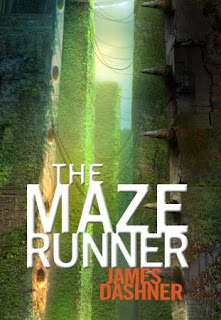
The story is pretty simple, a bunch of kids trapped in a giant maze for no apparent reason. It reads like a sort of cross between Lord of the Flies, Battle Royale, and the Hunger Games.
Emergency by Neil Strauss
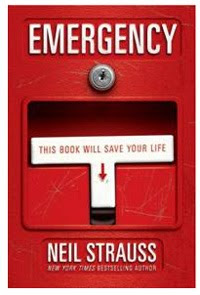
Monday
Born to Run by Christopher McDougall
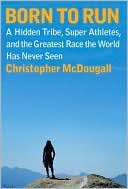 After I finished this book, someone asked me whether it’s a good book for non-runners. Honestly, I have no idea.
After I finished this book, someone asked me whether it’s a good book for non-runners. Honestly, I have no idea.Running has been a big part of my life for some time now. For the last ten years I’ve run. So it’s hard to say. When you put enough time into something, it’s pretty hard to separate yourself from it.
I can’t write a review from a non-runner’s perspective because that would be total speculation on my part.
What I can do is tell you that this is a fantastic book. If you are a runner, this is a must-read, easily the best book about running out there, and I’ve read a ton. You won’t find anything this in-depth, in touch, and you’ll never read anything else that gives you the vicarious thrills of superathletes and scientists alike.
The story is about the greatest endurance race of all time, but really that’s only a small part. It’s about a man who is feeling his body age and trying to figure what he can do about it. It’s about Caballo Blanco, a living legend whose story, a tall tale, is only more incredible because it is 100% true. The story of the Leadville 100 and the Tarahumara racing against Ann Trason is one of the best sports stories on the planet, expertly told by McDougall, and as any great sports story, it brings about greater truths about who we are and why we run.
More than anything, this books sets out to prove its title. Through science, through example, and through story after story of one incredible athlete after another, this book will leave no doubt in your mind that the greatest athletes in the world still like to get their drink on, that a group of humans can run down a deer, and that you and I were born to do it too.
It’s motivated me to try some new things. I don’t know if chia seeds are making me faster or stronger. And I can’t say for sure that barefoot running has unchained my feet and transformed them into running machines. But I can say that the spirit of the runners, Barefoot Ted, Scott Jurek, Billy “Bonehead” and Jen, the Lunas, and the dozens of characters in this book, each one more incredible than the last, the spirit of these runners is infectious and fuck this review I’m hitting the road.
Sunday
City of Thieves by David Benioff
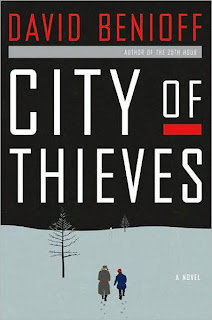 I try to avoid WWII stories most of the time. I just feel a little over it. So when my book club picked City of Thieves I had mixed feelings. On the one hand, it was a WWII drama. On the other hand, it was written by David Benioff, the same guy who brought us the 25th Hour, so there was reason to think that it might not be the kind of schmaltzy, life-affiriming thing we've come to expect from WWII fiction. And on the other, third(?) hand, a Russian library regular told me that he had read the book and that it seemed better researched than most of the American books about Russia.
I try to avoid WWII stories most of the time. I just feel a little over it. So when my book club picked City of Thieves I had mixed feelings. On the one hand, it was a WWII drama. On the other hand, it was written by David Benioff, the same guy who brought us the 25th Hour, so there was reason to think that it might not be the kind of schmaltzy, life-affiriming thing we've come to expect from WWII fiction. And on the other, third(?) hand, a Russian library regular told me that he had read the book and that it seemed better researched than most of the American books about Russia.The thing that makes City of Thieves different is that it doesn't feel like a book trying to force emotion on you by being set in WWII. It's a better-told story than that, putting the plot and the strong dialogue out there and letting the reader decide how to feel. There were moments of levity, and there were moments of darkness. But the reason it works is because the book doesn't ask us to do what so many others do, which is to erase all previous joy because of the new suffering. Just because things are bad on page 78, the book doesn't expect readers to forget they were laughing on page 68. It also has a very extemporaneous feel, less planned and plotted out, more characters thrown into the grinder and ending up one place or another. It surprises readers without going for the big twist.
It's written almost exactly the way we like our war stories. There is viloence, danger, broadly drawn heroes The story is almost a little too fantastic in spots, but that's exactly what makes it a pitch-perfect war story as opposed to a war novel.
Thursday
The Internet Is a Playground by David Thorne

What a great question, you jerk.
The success of David Thorne’s web site, www.27bslash6.com, got him a book deal. A complete book deal with pages, inks, cover, and so on. But part of the site’s success is that, working in graphic design, the web site is nicely formatted for computer viewing. Really it’s like reading an e-book where the intended format was a tiny screen. So why would one then take that e-book format and timewarp it into an analog book?
Well, because I don’t have the damn internet at home. Hence the above “jerk” comment.
The book is at its best in the email strings between David and his coworkers, local Blockbuster, and his son’s teacher. Like a sort of email Jerky Boy, he strings them along and the joke becomes the fact that someone would continue to correspond as long as they do. How much does someone have to tell you about the motion picture Water World before you, as a Blockbuster employee, feel that you’ve done your due diligence and let the dude rot in bad credit land? Apparently about one shitload.
The other postings vary. Some pretty great. Some great. Some pretty. Some none of those things.
You can probably just read it for free. Hell, you’re reading this on the internet right now, right? Try out this article: http://www.27bslash6.com/overdue.html and see if you like it.
Monday
Where We Going, Daddy? by Jean-Louis Fournier

Thursday
Cheesemonger by Gordon Edgar

I’m not what you’d call a foodie. I do like to cook, and I’m working on getting better at it, but at the same time knowing the ins and outs of foods isn’t a passion of mine. To put it simply, I love me an Oatmeal Cream Pie that’s been sitting in the glovebox (aka Dessert Cart) for a couple days.
That said, this book is pretty entertaining for someone who isn’t already interested in cheese.
What separates this book from other food books is that Edgar, though passionate about cheese, doesn’t try to foist his passion on everyone else. Edgar’s cheese vocabulary is helpful. He doesn’t use a bunch of bullshit terms that have no meaning. Edgar’s realistic, unapologetic for growing up on cheap-ass cheese, and he must have taken half a dozen opportunities in this book to say that you shouldn’t waste your money on the best cheese if you’re putting it on a plate for a big gathering or preparing a meal for a large group. The strengths of the book are the writing and Edgar’s honesty. In other words, he is not interested in making cheese the new wine.
The book also has some pretty decent sections on running co-ops and the harsh reality of agribusiness as well. Definitely worthwhile if you’re any sort of manager, but also if you’re interested in the world of work in general. One could draw parallels to books like Waiter Rant in terms of dealing with some difficult people and the ways in which retail economics play into food.
The rougher sections, for me at least, were the larger geo-political portions. I think he may have some decent points about Reaganomics and our reasons for fearing French cuisine, but I was a lot more interested in the ins and outs of the cheese.
The biggest success of the book is in its desire to introduce noobs to the cheese world. Every chapter ends with specific cheese recommendations and the book ends with a brief guide on how to buy cheese. This isn’t a book for food snobs or people that think certain foods are only for people who know all about them already. Edgar can’t say it (though, without putting words in his mouth, he seems to dance around it) because these people are his bread and butter, or at least the spreadable cheese, but food insiders can be really goddamn annoying. They’re kind of like people who like a band only up to the moment in which they become popular in that they seem to like the actual product less than what the product says about them. To them, a food becoming popular is a bad thing. A club just isn’t a club if you can’t turn people away at the door.
After reading this book I was motivated to try a couple cheeses he recommended. I should point out that I don’t live anywhere near a cheese shop or even a Whole Foods, so these were purchased at the tiny salad-bar-cheese-counter-conversion thing at King Soopers. To recap: a know-nothing purchasing cheese from a place that probably spends more time deciding what goes in the Halloween aisle than the cheese case. So take it all with a grain of salt. The size of a meteor.
 The first was Parmigiano Reggiano. This cheese comes up over and over in the book because it’s reasonably priced, hard to mess up, and because there is honestly a world of difference between the wedge of cheese I bought and the dust that comes in the green can. Don’t get me wrong, this is not me swearing off the green can. But the cheese is pretty damn good plain, and maybe it’s not the best use of good cheese, but try it as the cheese for your next Alfredo sauce. I wasn’t an Alfredo fan until I tried it with Parmigiano Reggiano. The flavor of the cheese is tempered a little by the cooking, I think, but the Alfredo has an actual taste besides salty milk, and the sauce had some stick to it instead of being so watery.
The first was Parmigiano Reggiano. This cheese comes up over and over in the book because it’s reasonably priced, hard to mess up, and because there is honestly a world of difference between the wedge of cheese I bought and the dust that comes in the green can. Don’t get me wrong, this is not me swearing off the green can. But the cheese is pretty damn good plain, and maybe it’s not the best use of good cheese, but try it as the cheese for your next Alfredo sauce. I wasn’t an Alfredo fan until I tried it with Parmigiano Reggiano. The flavor of the cheese is tempered a little by the cooking, I think, but the Alfredo has an actual taste besides salty milk, and the sauce had some stick to it instead of being so watery.  The second cheese I tried was Taleggio. The book said that it’s somewhat of a beginner in terms of stinky cheese. And stinky it was. The smell was…unpleasant. Biological. Foot-y. But I cut a piece off and ate it anyway. This is one of the few food experiences I can think of where the smell of the food was somewhat distant from the taste. It was like a horror movie where the trailer is scary as hell, but then you sit down and the overall feeling is much milder.
The second cheese I tried was Taleggio. The book said that it’s somewhat of a beginner in terms of stinky cheese. And stinky it was. The smell was…unpleasant. Biological. Foot-y. But I cut a piece off and ate it anyway. This is one of the few food experiences I can think of where the smell of the food was somewhat distant from the taste. It was like a horror movie where the trailer is scary as hell, but then you sit down and the overall feeling is much milder.Taleggio, I’m afraid, won’t be finding its way into my regular rotation. The softness combined with the stink was a little, um, advanced for my liking. The texture was a little like a rubbery cream cheese. I know, really appetizing. But hey, as an adult you really never have to eat new things. When you’re a kid, you’re eating new crap all the time. You hate it half the time, maybe because it’s infused with the bitterness you feel towards your parents for making you eat it, but there’s something to be said for trying a new food variety once in a while, no?
If you are interested in food, or at least want to take a second look at that cheese case when you go to the grocery store, give Cheesemonger a shot. Hell, it’s a good read either way.
Friday
Tips on Banning Books
 This gem of a human you see to my left recently tried to have manga (Japanese comics) banned from the library.
This gem of a human you see to my left recently tried to have manga (Japanese comics) banned from the library.Why?
She says of the books, "My son lost his mind when he found this...Now he's in a home for extensive therapy."
I don't want to attack the victim too much here, but if a Japanese comic from the public library sent you spiraling into a loony bin, maybe you didn't have a super tight grasp on reality to begin with.
Could that dude in the middle of the picture look any more bored? He doesn't look like he gives one damn.
So why do people try to ban books? Really, what's the point, especially when most attempts to ban a book only result in a dramatic sales increase?
However, that sales increase is what I'm banking on should I ever crank out some shit book, so I would like to present a little advice on getting a book ban done right.
Tip 1: Try your best to come off as some sort of sane person. If you appear in front of some board or city council at some point, don't wear your loudest blue floral dress. I know you really want to draw attention to yourself, but you're taking it a little too far. Museum guides don't use those glowing orange popsicle things that the guys on the airport runway use, so let's calm it down a couple notches. Broadcast your sanity and people might take you a little more seriously.
Tip 2: Maybe be a little more realistic about your claim of a book's effects. For example, rather than trying to convince me that a teenager's psyche was destroyed by a scantily clad woman or someone with a sword slicing through his abdomen, you explain the realistic consequences. For example, in this case these books have the negative effect of you bothering everyone at this stupid meeting where they probably don't get anything done anyway, so they can reduce this effect by pulling the books.
Tip 3: Leave god out of it. I know you're really tempted to get god-y, but hold on a sec. What you really want to do is call someone out, not bring someone in. Tango Makes Three is challenged a lot because the penguins are gay(?), but let the others bring in the part where god's not cool with that. Call out the gays, the people who speak Spanish, or whoever, but let god be implied. Hell, he's everywhere, right? He doesn't need your help.
Tip 4: Actually read some of the material. The first questions a library or school are going to ask you will concern the specifics of what you found offensive. That means page numbers. That means passages. Luckily for you, when my shit book comes out it'll have a little card in the back that tells you where all the absolute worst shit is. That will help you speed up the process.
Tip 5: Don't hold a book burning or try to hoard all the copies or some such shit. And there's a damn good reason for this: Where are you getting the copies? Unless you're robbing an author of copies in his garage, the author is putting coin in his pocket when you bring one to toss on the fire. A book sells for the same money regardless of whether you take it home and read it a hundred times or use it to steady a wobbly table. Even if you steal it, the store absorbs that cost, not the publisher, definitely not the author. And they will order more. So again, don't waste your time trying to take away the copies from anybody else, except in the case of my book. In that case, you're lucky because I'm doing an extra print run of cheaply bound copies meant to be burned. Please buy enough to make an impressive fire and keep me in sunglasses.
In conclusion, stop wasting your time. More importantly, stop wasting everyone else's time. I'm a fan of a lost cause, but don't push it, freedom fighter.
Saturday
Talking to Girls About Duran Duran by Rob Sheffield

1. Get books before they come out.
2. Review them. Post on helpfulsnowman.com.
3. This is wildly popular somehow.
4. Actually get paid to review books.
5. Start career as sincere, earnest critic with insightful things to say.
6. Almost immediately slide into the world of writing cover quotes that are about half a sentence. “The writer has defied science and written a book as electrifying as it is grounding.” “More mesmerizing than a swinging pocket watch right in front of my goddamn face that time I was in Vegas and somehow ended up at a magic show.” “Not since I got a lighter with a woman on it where you rub her bikini and it disappears have I been this invested in the resolution of a mystery.”
7. Get job at the New York Something.
8. Attempt to discourage young, Bambi-eyed kid reviewer from getting in over his head, actually reading all these books he reviews.
9. Bury corpse of Bambi-eyed kid reviewer somewhere near the waterfront.
So without further ado, let’s get this career a-launching!
T
The Go-Go’s, “Our Lips Are Sealed”
David Bowie, “Ashes to Ashes”
Ray Parker Jr., “A Woman Needs Love”
The Rolling Stones, “She’s So Cold”
The Human League, “Love Action”
O.M.D., “Enola Gay”
Culture Club, “I’ll Tumble 4 Ya”
Hall & Oates, “Maneater”
Roxy Music, “More Than This”
Bonnie Taylor, “Total Eclipse of the Heart”
Haysi Fantayzee, “Shiny Shiny”
A Flock of Seagulls, “Space Age Love Song”
Chaka Khan, “I Feel For You”
Prince, “Purple Rain”
Paul McCartney, “No More Lonely Nights”
Madonna, “Crazy For You”
The Replacements, “Left Of The Dial”
The Smiths, “Ask”
The Psychedelic Furs, “Pretty In Pink”
Lita Ford, “Kiss Me Deadly”
Tone Loc, “Funky Cold Medina”
New Kids On The Block, “Hangin’ Tough”
Big Daddy Kane, “Ain’t No Half Steppin’”
L’Trimm, “Cars With Boom”
Duran Duran, “All She Wants Is”
Fencing the Sky by James Galvin

Friday
How Did You Get This Number by Sloane Crosley
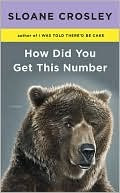
The Art of Racing in the Rain by Garth Stein

The Suicide Collectors by David Oppegaard

Was She Pretty? by Leanne Shapton

Well, there are only two real answers to that. Yes, which I would hope because don't we at least try to date people who are attractive? And No, which means that I don't date attractive people, which says something not nice about you. Either answer is not helping anyone feel better.
This is the lady equivalent of, "Was he bigger or smaller downstairs?" Again, neither answer is really satisfying. Besides, don't ask me to compare past, 18 year-old sex, which came at a time when boners were more common than old gum mashed on the sidewalk, to current. That's not fair to anyone, especially my peep.
The Boy Who Couldn't Sleep and Never Had to by DC Pierson

Born Standing Up by Steve Martin

A Common Pornography by Kevin Sampsell
 Well, it has ups and downs.
Well, it has ups and downs.The book is written in short vignettes, which works well for me. It's an interesting way to write autobiography because it allows you to focus on only the parts that are interesting or engaging. But I started feeling like the book fell in a trap where the vignettes seemed a little too disconnected, and they start to have little meaning to the reader though it's clear that they are significant to the writer. Especially the parts about girls. I coudn't keep them straight, nor did I really care to. I don't keep in touch with most of my exes, so why would I want to add someone else's to my life?
The book was mostly about the author's twenties, it seemed like, which is a pretty boring part of someone's life. And that's coming from someone in his twenties. I have some shit I could write about, some girlfriend issues and so on, but I don't think it's that interesting. If you recorded yourself talking to a girl you were interested in every year in your twenties and then listened to the tapes on your birthday, you'd be depressed as hell.
I guess, ultimately, I felt like these were important events in the life of the author, but he didn't really take us to a place where I felt like I knew him. He's like the older kid in high school who you know all about but never hung out with.
Tuesday
Things We Didn't See Coming by Steve Amsterdam

There are some interesting elements to the book, for sure. The style of having a series of short stories that take us through the narrator's life allow us to see the re-crumbled society, some of the middle, and then the end. There are some really good scenes in here, but if you're looking for a sort of action-packed apocalypse/survival thing, this isn't your best bet.
The book went into a bit of a romance thing that didn't really do a whole lot for me towards the middle. That's me, I guess. It's an interesting idea to consider that people will still be in love and whatnot during the apocalypse, but the somewhat detached voice, which makes sense as that's the character's survival tactic, doesn't mesh all that well with the romantic portions for me. And why would you bother with writing a 3-way scene in the middle of the earth's slow decline? Okay, if fire is raining down and horsemen are getting shit done, I get that. Act of passion before the final end. Why the hell not? But when we're just sort of slowly sinking into oblivion there's no real reason for it. I can speak on that with personal authority.
Ultimately, it's not bad and pretty short at 199 pages, which is a plus in my book. If you are reading, at least get up through the story with the main chaacter's horse running away. If you're not feeling it after that, I say put it down.
Tell-All by Chuck Palahniuk
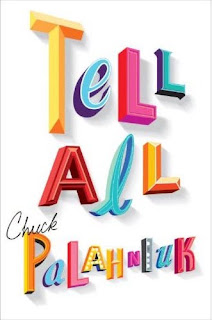
Chasing the White Dog by Max Watman
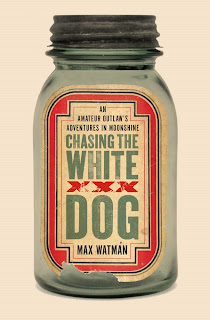
Pop. 1280 by Jim Thompson

Well, there are a couple different things I've read about this book.
1. Reviews along the lines of "Nobody writes through the mind of a sick bastard like Jim Thompson."
2. Reviews that say something about a dopey small-town sherriff who bumbles his way through things.
I think I was expecting something like a Confederacy of Dunces by Cormac McCarthy. But I was a little disappointed. If you're thinking about reading this book, give it until at least page 57. That's where the real tone of the book begins. The author takes you for a little bit of a ride, but that's about where you get on solid ground.
Overall, the book set up an expectation that it didn't maintain throughout. The plot twists around quite a bit, but the twists were more quirky than dark or engaging.
The main thing people seem to be saying about this author is that he is a master of black humor, which I didn't find to be true in this book. And that's not because I don't find murder and whatnot funny. Murder can be hilarious. Have you ever see a clown murder someone, or a sped-up video clip of someone being murdered to the Benny Hill theme? Good stuff. But the murder in this book is mostly part of a plan to bang a couple different ladies. It's more like a hillbilly Three's Company than anything else, climbing out the window to bang some other lady and shit like that.
You're a Horrible Person But I Like You, the Believer Book of Advice
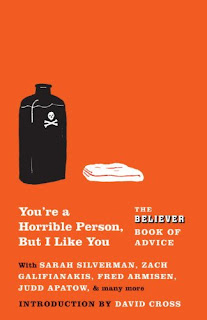
-Foot Pain in Brisbane
Pete
Monday
The Big Rewind by Nathan Rabin

Blog Archive
-
▼
2010
(25)
-
►
September
(14)
- Talking to Girls About Duran Duran by Rob Sheffield
- Fencing the Sky by James Galvin
- How Did You Get This Number by Sloane Crosley
- The Art of Racing in the Rain by Garth Stein
- The Suicide Collectors by David Oppegaard
- Was She Pretty? by Leanne Shapton
- The Boy Who Couldn't Sleep and Never Had to by DC ...
- Born Standing Up by Steve Martin
- A Common Pornography by Kevin Sampsell
- Things We Didn't See Coming by Steve Amsterdam
- Tell-All by Chuck Palahniuk
- Chasing the White Dog by Max Watman
- Pop. 1280 by Jim Thompson
- You're a Horrible Person But I Like You, the Belie...
-
►
September
(14)
About Me

- H.S.
- Cover My Ass Time: This is all happening in a magical, fictional universe. Any resemblance to anything ever is strictly the product of a weak imagination, for which I apologize.


